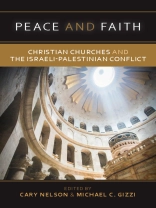PEACE AND FAITH: Christian Churches and the Israeli-Palestinian Conflict, composed of new essays, is the first collection to bring together writers from different faith communities to discuss the Boycott, Divestment, and Sanctions movement’s impact on one of the more fractious topics addressed by Christian denominations: the Israeli-Palestinian conflict. In so doing, it builds on interfaith projects under way for decades. Theology and politics intermingle in debates taking place in local churches, Christian NGOs, and national church meetings that define official policy. The debates revive and reframe the most basic values of Christianity and the questions church members seek to resolve: How do Christians today hew to the principles Jesus articulated? How can justice be pursued in the context of competing national narratives and historical understandings? What bearing do or should centuries of Christian violence against Jews and Muslims have on contemporary theology and ethics? Is it ethical, or even possible, to set aside millennia of Christian anti-Semitism in judging Israel’s conduct? What Christian values should be honored in pursuing Jesus’s mission of reconciliation today? How may the pursuit of truth be corrupted by passionate social witness? Can advocacy cross the line into hatred? These are among the critical questions this collection poses and attempts to address.
Tabella dei contenuti
Preface
INTRODUCTION: The Political and Theological Foundations of Christian Engagement with the Jewish State
PART ONE: THE HOLY LAND AND THE POLITICS OF RELIGIOUS BELIEF
1. Edward Kessler, “Christianity, Jews, and Judaism”
2. Amy-Jill Levine, “The Gospel and the Land Revisited: Exegesis, Hermeneutics, and Politics”
3. Daniel Friedman, “American Christianity, Israel, and the US Presidency”
4. Giovanni Matteo Quer, “Catholic Organizations and the Delegitimization of Israel”
5. Jonathan Rynhold, “Evangelicals and the Israeli-Palestinian Conflict”
6. C. K. Robertson, “Complexity and Contention: Four Decades of The Episcopal Church’s Responses to the Palestine-Israel Question”
7. Robert A. Cathey, “Where We Live, What We Believe: Thinking Contextually with Ateek, Raheb, and Gregerman about Israel/Palestine”
8. David Fox Sandmel, “The Kairos Palestine Document, Anti-Semitism, and BDS”
9. John Kampen, “Assessing the 2017 Mennonite Resolution on Israel/Palestine”
PART TWO: BOYCOTT CAMPAIGNS IN THE PRESBYTERIAN CHURCH USA
10. Daniel Friedman, “Battle for The Holy Land(s): The Evolution of American Protestant Polarization on Israel and Palestine”
11. John Wimberly and William Harter, “When the PCUSA Began to Mirror the Middle East”
12. Michael C. Gizzi, “Zionism Unsettled and the 2014 PCUSA Battles over Divestment”
13. Cary Nelson, “A Critical Reading of Zionism Unsettled, Its Antecedents, and Its Legacy”
PART THREE: RECONCILIATION—GUIDEPOSTS FOR THE FUTURE
14. Susan Andrews, “Spiritual Siblings Sharing Sacred Space: A Pastor’s Reflection”
15. Michael C. Gizzi, “Reconciliation, Shared Society, and Co-existence Efforts between Israelis and Palestinians: An Overview”
16. Cary Nelson, “A Reconciliation Roadmap”
APPENDIX
David Fox Sandmel, “Preface to a Timeline: A Brief History of Anti-Semitism”
Cary Nelson, “Annotated Timeline of Jewish/Christian Relations and the History of Anti-Judaism”
NOTES
BIBLIOGRAPHY
NOTES ON CONTRIBUTORS
INDEX
Circa l’autore
Cary Nelson is Jubilee Professor of Liberal Arts & Sciences at the University of Illinois at Urbana-
Champaign, a former president of the American Association of University Professors, and current chair
of the Alliance for Academic Freedom. He is the author or editor of 35 books, most recently Israel
Denial: Anti-Zionist, Anti-Semitism, & The Faculty Campaign Against the Jewish State.







![Copertina di Brian Schrag & Julisa Rowe: Community Arts for God's Purposes [Chinese] 貼近神心意的社群藝術 Copertina di Brian Schrag & Julisa Rowe: Community Arts for God's Purposes [Chinese] 貼近神心意的社群藝術](https://static.worldofdigitals.com/thumb_webp/740/9781645083740.webp)




